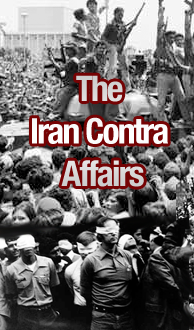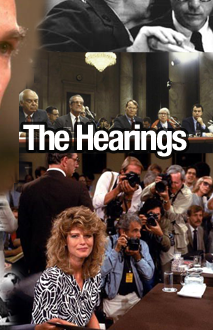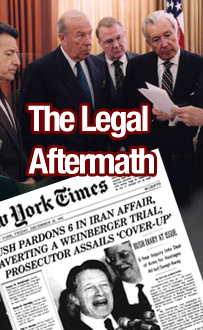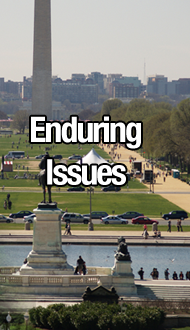- Nov. 13, 1986: President Ronald Reagan makes his Address to the Nation on the Iran Arms and Contra Aid Controversy.
- Nov. 25, 1986: Reagan announces that profits from arms sales with Iran were diverted to support the Contras.
- Nov. 26, 1986: Reagan appoints a commission, led by former Senator John Town (R-TX), to investigate the Iran-Contra Affairs.
- Dec. 2, 1986: Reagan makes his Address to the Nation on the Investigation of the Iran Arms and Contra Aid Controversy.
- Dec. 4, 1986: Attorney General Edwin Meese III requests that an independent counsel be appointed to investigate the Iran-Contra Affairs.
- Dec. 6, 1986: To determine the flow of funds from private entities, foreign nations, and arms sales to Iran, the U.S. Department of Justice requests financial records from Albert Hakim and Richard Secord's Switzerland-based “Enterprise.”
- Dec. 19, 1986: A panel of judges appoints Lawrence Walsh as Independent Counsel.
- March 4, 1987: Reagan makes his Address to the Nation on Iran-Contra.
- March 5, 1987: Walsh also receives an appointment as Independent Counsel from the U.S. Department of Justice. He requested this appointment because he was afraid, given other challenges to the constitutionality of the Independent Counsel Act (see Morrison v. Olson, which had not yet been decided in 1987), that his position would be deemed unconstitutional.
- April 28, 1987: Walsh submits a report to Congress that details the problems to his investigation posed caused by immunity grants.
- April 29, 1987: Carl Channell pleads guilty to conspiracy to defraud the United States.
- May 6, 1987: Richard Miller pleads guilty to conspiracy to defraud the United States.
- July 7-10 and July 13-14, 1987: Oliver North provides immunized testimony to Congress.
- July 15-17 and July 20-21, 1987: John Poindexter provides immunized testimony to Congress.
- Nov. 10, 1987: The Independent Counsel receives Enterprise records which, pursuant to a treaty with Switzerland, may not be used to prosecute tax crimes.
- March 11, 1988: Robert McFarlane pleads guilty to withholding information from Congress.
- March 16, 1988: A grand jury indicts North, Poindexter, Richard Secord and Albert Hakim on conspiracy to defraud the United States.
- June 8, 1988: The presiding judge, Judge Gerhard Gesell, orders separate trials for North, Poindexter, Secord, and Hakim because they planned to use the immunized testimony of their co-defendants in their own defenses.
- Jan. 31, 1989-May 4, 1989: The North trial leads to a three-count conviction.
- April 7, 1989: A grand jury indicts Secord on nine additional charges involving perjury, false statements, and obstruction.
- April 21, 1989: A grand jury indicts Joseph Fernandez on charges of false statements and obstruction.
- Nov. 8, 1989: Secord pleads guilty to making false statements to Congress.
- Nov. 21, 1989: Hakim pleads guilty to supplementing the salary of a government official. Lake Resources Inc., of which he is the primary shareholder, pleads guilty to a corporate felony of diverting Iran arms sales proceeds to the Contras.
- Nov. 24, 1989: The case against Fernandez is dismissed after the attorney general refuses to allow the disclosure of certain classified information. Walsh appeals the trial court's Classified Information Procedures Act (CIPA) rulings.
- Feb. 16-17, 1990: Reagan provides videotaped deposition in the Poindexter trial.
- Feb. 22, 1990: A grand jury indicts Thomas Clines on tax charges.
- March 5, 1990-April 7, 1990: Poindexter trial leads to a five-count conviction.
- July 20, 1990: The U.S. Court of Appeals vacates North's convictions on the grounds that witnesses' recollections could have been influenced by immunized testimony and orders the District Court to hold further hearings on this issue.
- Sept. 6, 1990: The Fourth Circuit upholds the trial court's CIPA rulings in Fernandez. The case is dismissed.
- Sept. 4-18, 1990: Clines trial leads to convictions on four felony charges.
- July 9, 1991: Alan Fiers, Jr., pleads guilty to withholding information from Congress.
- Sept. 6, 1991: A grand jury indicts Clair George on 10 counts involving perjury, false statements and obstruction.
- Sept. 16, 1991: The Independent Counsel moves to dismiss the charges against North after two days of hearings on the immunity issue.
- Oct. 7, 1991: Elliott Abrams pleads guilty to withholding information from Congress.
- Nov. 15, 1991: Court of Appeals for the D.C. Circuit reverses Poindexter's convictions, also because of the immunized testimony issue.
- Nov. 26, 1991: A grand jury indicts Duane Clarridge on seven counts involving perjury and false statements.
- May 25, 1992: Clines begins serving 16-month jail sentence.
- June 16, 1992: A grand jury indicts Caspar Weinberger on five charges of obstruction, perjury and false statements in both Walsh's and the congressional investigations.
- August 26, 1992: A jury fails to reach a verdict in the George case, leading the Independent Counsel to announce the case will be tried again.
- Oct. 19, 1992: A second trial of George, on seven counts, begins.
- Dec. 9, 1992: George is found guilty on two counts of false statements and perjury before Congress; he was to be sentenced in February 1993.
- Dec. 11, 1992: White House informs Walsh that now-President George H.W. Bush kept diaries relevant to Iran-Contra, but they had been withheld from investigators.
- Dec. 24, 1992: President Bush pardons Weinberger, Clarridge, McFarlane, Fiers, Abrams and George
|









